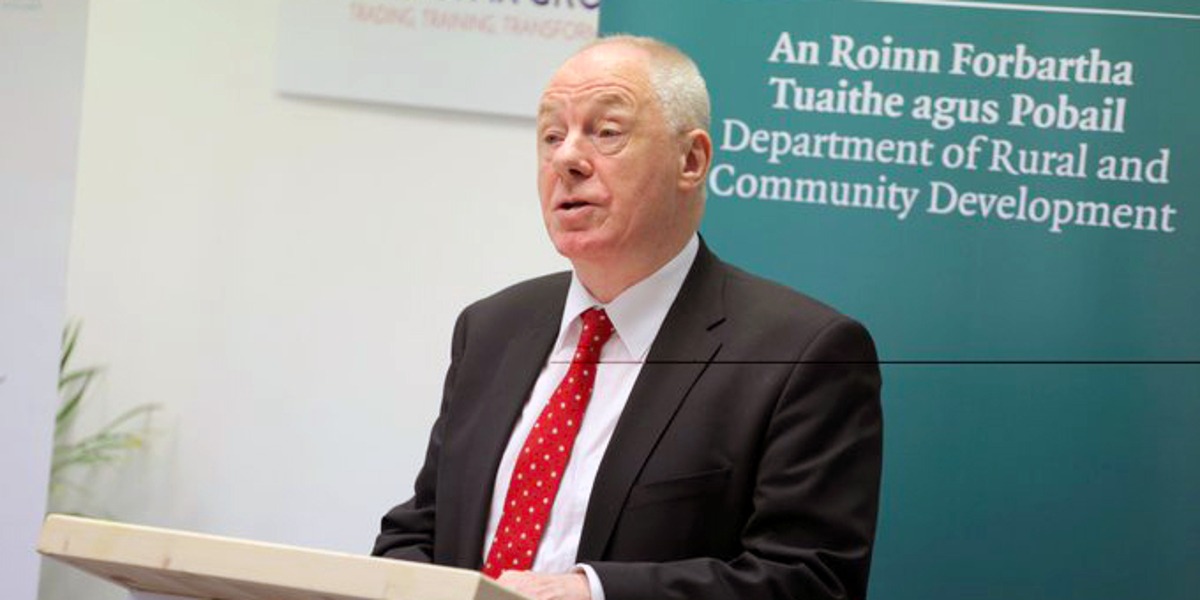As the Irish government unveiled the country’s first national social enterprise policy, positive comments started rolling in from organisations throughout the sector.
On 18 July, 2019, Minister for Rural and Community Development Michael Ring launched the government’s first-ever policy on social enterprise. It has since been widely welcomed.
Acknowledging there had been a long wait, and thanking those who pushed for it, Minister Ring said the new policy would “enable social enterprises to grow in scale, support jobs, and make a positive impact on individuals and communities in both rural and urban areas”.
“The policy and the [26] commitments it contains will enable social enterprise to reach its full potential,” he said.
The policy aims to provide support by increasing awareness of social enterprise, growing and strengthening social enterprise, and improving policy alignment. These aims will be put into action between now and 2022.
The Irish Local Development Network (ILDN) was among many to express support following the launch, which was held in Coolock, Dublin. The chairperson of the ILDN’s working group on social economy, Pádraig Casey, congratulated the Department of Rural and Community Development on completing the policy, explaining why such a “supportive framework” was welcome:
“Ireland is highly reliant on social enterprise, yet has the potential to create many more services and jobs in the sector. According to a 2013 Forfás report, Ireland’s social enterprise sector supports over 25,000 jobs, but has the potential to create at least a further 65,000. Before now, a framework has been lacking to drive this potential.”
He said that local development companies (LDCs) are “ideally placed to deliver support for local social enterprise development” in collaboration with others.
LDCs have 40 members of staff around the country dedicated to supporting social enterprises.
Plaudits from experts
Dr Senan Cooke – co-founder of Communities Creating Jobs and author of The Enterprising Community – told us, “This policy is going to open possibilities beyond comprehension.”
“I really am excited about the new policy. I see it as a seminal document and, if properly implemented, it will transform the social enterprise sector.
“It’s the right thing at the right time. There’s a huge interest in – and a huge need for – social enterprise right now,” he said.
Calling on people to promote the new policy, he said progress will take time: “A lot will depend on the department’s implementation group and their determination to bring a whole-of-government approach, though there is a growing awareness of the potential of social enterprise among the officials and beyond.
While it could “take a few years to really get the full potential onto the table,” the potential was huge.
“Social enterprise is a massive sleeping giant, which should be leading the way in revitalising communities,” he said.
Speaking at the launch, Paul O’Sullivan, CEO of Clann Credo, said that the policy delivers a road map that will, in turn, “lead to both provision and preservation of badly needed jobs and services at local level in every region of Ireland.”
Meanwhile, on social media, the Carmichael Centre said the policy would “help to grow and strengthen social enterprises”.
The National Social Enterprise Policy will help to grow and strengthen social enterprises. Through our coaching programme, Carmichael works with fantastic, inspiring social enterprises around Ireland. @pobal @DeptRCD @MichaelRingFG @Andrewforde_IRE @Clann_Credo #SocEnt pic.twitter.com/LIwGkYeyOe
— Carmichael (@Carmichael_IRL) July 18, 2019
Camara praised the “focus on leadership and better policy alignment,” while University College Cork’s Ignite incubator programme was pleased that “the value of [their] social entrepreneurs and social enterprises won’t go unnoticed”.
Great to see a focus on Leadership and better Policy Alignment included in the objectives of the new #SocEntPolicy2019 @MichaelRingFG @DeptRCD#Socent #SocialEnterprise #socialinnovation pic.twitter.com/NYGIeidSZ8
— Camara Ireland (@CamaraIreland) July 19, 2019
Great to see a Social Enterprise Policy being published,the value of our #socialentrepreneurs & #socialenterprises wont go unnoticed, Two of our current #ignitestartups @nicoleclareryan of @AlexsAdventure5 & @Emer_Keaveney of @ORCireland working hard & making an impact #SocEnt https://t.co/8bpTb8rs6B
— IGNITE (@IGNITEUCC) July 18, 2019
Community Finance Ireland is a charity that gives loans to community groups, charities, sports clubs and social enterprises, and it said the policy would help their 51 social enterprise customers to grow “and bring deeper awareness of the economic and social impact they deliver”.
We are working with 51 Social Enterprise Customers today. This new policy will help them grow, scale and bring deeper awareness of the economic and social impact they deliver. A welcome support #socent #socialenterprisepolicylaunch2019 pic.twitter.com/FBawOW4ixz
— CommunityFinanceIrl (@ComFinanceIrl) July 18, 2019
They agreed with Minister Ring when he said there was no reason Ireland could not become a leader in social enterprise internationally.
A launch with social enterprise pedigree
The launch was hosted by Speedpak, a social enterprise based in Coolock on Dublin’s northside. It works to improve the employability of long-term unemployed people by providing real work experience, training and mentoring. [Disclosure: Changing Irelandis among its customers – Speedpak packs and distributes our magazine.] Catering at the launch was provided by Mugshot, a social enterprise set up to train ex-offenders as baristas and provide them with employment after release.
The new National Social Enterprise Policy for Ireland will complement a new five-year strategy to support the community and voluntary sector in Ireland, and a new national volunteering strategy, both of which are also being developed by the department.
The final definition
The 30-page policy outlines the advantages of having a nationally-defined view of social enterprise, not least that – once a clear definition is in place – social enterprise activity in Ireland can be measured and better supported.
The draft policy attracted a lot of attention when it was published in April and over 100 submissions were made by mid-May, many of which were querying the proposed definition of social enterprise. It has since been refined.
In the draft, for example, co-operatives – which many would argue are the original social enterprises – were omitted. Following the public consultation, co-ops that met certain conditions were included.
Ireland’s definition is now broadly in line with those of other EU institutions.
It reads: “A social enterprise is an enterprise whose objective is to achieve a social, societal or environmental impact, rather than maximising profit for its owners or shareholders.
“It pursues its objectives by trading on an ongoing basis through the provision of goods and/or services, and by reinvesting surpluses into achieving social objectives.
“It is governed in a fully accountable and transparent manner and is independent of the public sector. If dissolved, it should transfer its assets to another organisation with a similar mission.”
Reporting by Kirsty Tobin and Allen Meagher.





